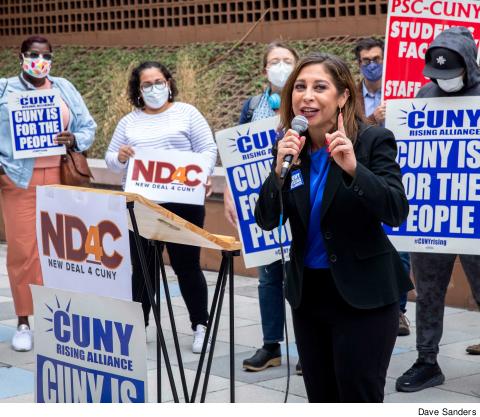The time is right for passage
 |
Queens Assembly Member Jessica González-Rojas recalls a lot from her time as an adjunct professor in the Latin American and Latino Studies department at City College. She remembers seeing plastic buckets on the floor used to catch water dripping from leaky ceilings and other signs of disrepair at Manhattan’s oldest public college. “I remember the really low pay,” she said. “I know what it means to see disinvestment.”
González-Rojas is one of the many state lawmakers who have expressed their enthusiasm about the New Deal for CUNY, a bill backed by the PSC and the CUNY Rising Alliance, which would make CUNY tuition-free, add full-time faculty, mental health counselors and academic advisors, increase pay for adjuncts and invest in infrastructure and the physical maintenance of CUNY campuses. González-Rojas noted that she was born in 1976, the year after CUNY stopped being tuition-free in the wake the city’s financial crisis. “In my lifetime I want to see a free CUNY,” she said.
LAWMAKERS ON BOARD
The New Deal for CUNY bill (S4461/A5843) was introduced earlier this year by State Senator Andrew Gounardes and Assembly Member Karines Reyes. The bill had 36 cosponsors in the Assembly and 18 in the Senate at press time.
Reyes joined with lawmakers, PSC activists and other CUNY advocates outside the Borough of Manhattan Community College on October 5. She said, “We deserve the best for CUNY students,” noting that the bill would allow for the hiring of more full-time, tenure-track professors.
Among others in attendance at the October rally were Assembly Members Kenny Burgos and Nathalia Fernandez.
PSC President James Davis expressed optimism that the stars may be aligned in the next few months to push through the New Deal for CUNY: both houses of the state legislature are controlled by Democrats and the new governor, Kathy Hochul, has gone to great lengths to separate herself from her austerity-obsessed predecessor. “We do have allies and champions in Albany, we do have allies and champions in city hall,” said Davis, noting that the alliance between lawmakers, unionists and student activists make up an “extraordinary coalition.”
MAKING THE CASE
Davis added, “It’s a privilege to be in a struggle like this.”
In a Daily News op-ed Davis hammered home the point that the dire need for the New Deal for CUNY is in large part the result of former Governor Andrew Cuomo’s brutal campaign of disinvestment in the university.
“Tuition at CUNY senior colleges increased by 43% during Governor Cuomo’s tenure and state investment per student fell by 3.6%, when adjusted for inflation. Cuomo starved CUNY of resources by refusing to fund routine increases in operating costs, even workers’ negotiated raises. He twice vetoed bills passed by the legislature to stabilize CUNY and SUNY funding, forcing colleges to cut academic programs and student services and rely increasingly on underpaid adjunct faculty, more than 10,000 of whom CUNY now employs.”
This chronic state disinvestment in CUNY has had a crippling impact on the university’s workforce. CUNY senior college faculty salaries lag far behind those in other major state university systems. A recent CUNY University Faculty Senate report showed that as a result of this disinvestment, the difference between resourcing for SUNY and CUNY is staggering.
“Most SUNY senior college students already have the advantage of more faculty members per 1,000 full-time equivalent students, so CUNY (and several lower-staffed SUNY campuses) should be funded to catch up. Based on Fall 2018 and Fall 2019 statistics, no CUNY campus meets the SUNY average full-time faculty rate. But some CUNY campuses are critically short of faculty,” the report said. “The faculty gap did not exist in 2003. It gradually and consistently developed in the past 17 years. The current situation is educationally and morally unacceptable, and there is no historical explanation or excuse that can justify it.”
The New Deal for CUNY is meant to address systemic underfunding. Doing so will improve the quality of education and the quality of the workplace for CUNY faculty and staff.
Davis said in his op-ed, “The governor and presumptive mayor can finally set CUNY on a sustainable path by building the provisions of the New Deal for CUNY into their budgets.”

